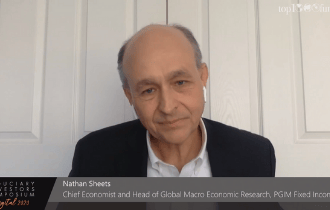Nathan Sheets, the former undersecretary of the U.S. Treasury for international affairs representing the U.S. government on international economic policy, and now chief economist at PGIM will outline the expected policy responses from a Biden government and what that means for global interest rates, currencies and sovereign debt and credit markets. The prospect of global inflation is a conversation around all investment committee meetings this year. This session will also look at what deep structural factors are driving inflation, or disinflation, and what that means for emerging and developed markets heading into 2021.
Nathan Sheets, PhD, is chief economist and head of global macroeconomic research at PGIM Fixed Income. He is responsible for the oversight of the firm’s global macroeconomic research team, leading the formulation of the global macroeconomic outlook, supporting fundamental views on developed and emerging countries, and the analysis of global interest rate, currency, sovereign, and credit markets. He is a member of the senior investment team and provides thought leadership on global monetary and fiscal policy and macroeconomic trends. Sheets was most recently the undersecretary of the US Treasury for international affairs, representing the US government on international economic policy. Previously, he held positions with Citigroup, as global head of international economics, and with the Federal Reserve Board, most recently as director of the division of international finance and FOMC economist. He earned a Bachelor’s in Economics from Brigham Young University and a Ph.D. from the Massachusetts Institute of Technology.
White is responsible for the content across all Conexus Financial’s institutional media and events. She is responsible for directing the bi-annual Fiduciary Investors Symposium which challenges global investors on investment best practice and aims to place the responsibilities of investors in wider societal, and political contexts, as well as promote the long-term stability of markets and sustainable retirement incomes. She is the editor of conexust1f.flywheelstaging.com, the online news and analysis site for the world’s largest institutional investors. White has been an investment journalist for more than 20 years and has edited industry journals including Investment & Technology, Investor Weekly and MasterFunds Quarterly. She was previously editorial director of InvestorInfo and has worked as a freelance journalist for the Australian Financial Review, CFO, Asset and Asia Asset Management. She has a Bachelor of Economics from Sydney University and a Master of Arts in Journalism from the University of Technology, Sydney. She was previously a columnist for the Canadian publication, Corporate Knights, which is distributed by the Globe and Mail and The Washington Post. White is currently a fellow in the Finance Leaders Fellowship at the Aspen Institute. The two-year program consists of 22 fellows and seeks to develop the next generation of responsible, community-spirited leaders in the global finance industry.
Key takeaways
- Biden’s team is experienced both as individuals and also as a collective team, so policy process is likely to be transparent to the public. Governance and policy by tweet will be a thing of the past.
- Biden will see flaws in the economy and will take steps to rectify them, including in the areas of inequality, healthcare and climate change. Climate policy will be a critical part of what the Biden administration will focus on. Biden will quickly rejoin the Paris Agreement.
- Job 1 for Janet Yellen will be to address the impact of the virus on the economy including the need to restore jobs and get people back to work as soon as possible. Nobody knows the US labour market more deeply than Janet Yellen.
- The appointment of Brian Deese to lead the National Economic Council is a very important step.
- US policy on China will stay strategically tough as they were under Trump but the methods Biden will apply will be much different, to bring in allies around the world to put constructive pressure on China to, for example, respect foreign technologies
- The post-pandemic period will feel much like the pre-pandemic experience, with soft to moderate growth, low inflation and likely low rates.
- It is possible as we get back to normal that we will see some temporary periods of high inflation but within a couple of years low inflation is expected to be the norm.
- In a low inflation, low rate environment the reach for yield will continue which bodes well for risk assets including in the credit space. Equities for yield may also become attractive.
- There is scope over the next few years for the US dollar to depreciate to a certain extent relative to RMB and emerging market currencies.
Poll results
Are you hedging your portfolio against inflation?






